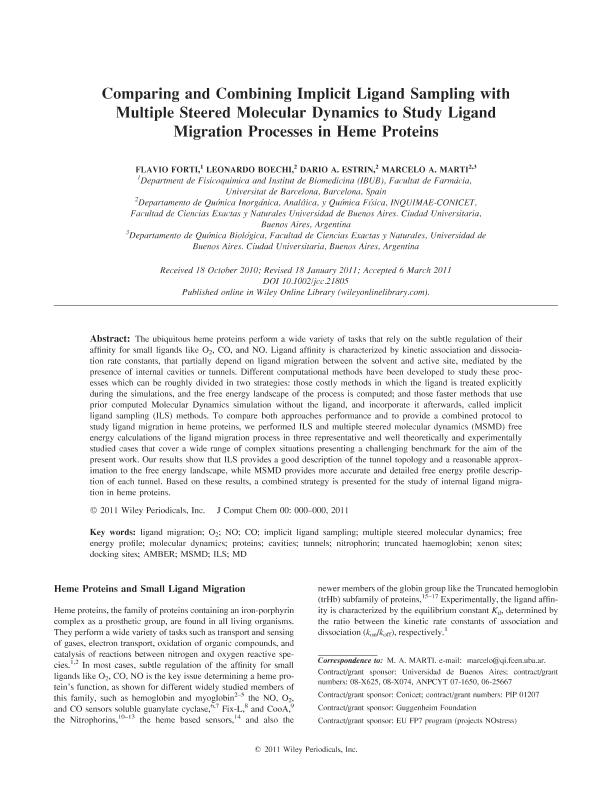Mostrar el registro sencillo del ítem
dc.contributor.author
Forti, Flavio
dc.contributor.author
Boechi, Leonardo

dc.contributor.author
Estrin, Dario Ariel

dc.contributor.author
Marti, Marcelo Adrian

dc.date.available
2019-02-19T17:59:24Z
dc.date.issued
2011-07
dc.identifier.citation
Forti, Flavio; Boechi, Leonardo; Estrin, Dario Ariel; Marti, Marcelo Adrian; Comparing and combining implicit ligand sampling with multiple steered molecular dynamics to study ligand migration processes in heme proteins; John Wiley & Sons Inc; Journal Of Computational Chemistry; 32; 10; 7-2011; 2219-2231
dc.identifier.issn
0192-8651
dc.identifier.uri
http://hdl.handle.net/11336/70444
dc.description.abstract
The ubiquitous heme proteins perform a wide variety of tasks that rely on the subtle regulation of their affinity for small ligands like O2, CO, and NO. Ligand affinity is characterized by kinetic association and dissociation rate constants, that partially depend on ligand migration between the solvent and active site, mediated by the presence of internal cavities or tunnels. Different computational methods have been developed to study these processes which can be roughly divided in two strategies: those costly methods in which the ligand is treated explicitly during the simulations, and the free energy landscape of the process is computed; and those faster methods that use prior computed Molecular Dynamics simulation without the ligand, and incorporate it afterwards, called implicit ligand sampling (ILS) methods. To compare both approaches performance and to provide a combined protocol to study ligand migration in heme proteins, we performed ILS and multiple steered molecular dynamics (MSMD) free energy calculations of the ligand migration process in three representative and well theoretically and experimentally studied cases that cover a wide range of complex situations presenting a challenging benchmark for the aim of the present work. Our results show that ILS provides a good description of the tunnel topology and a reasonable approximation to the free energy landscape, while MSMD provides more accurate and detailed free energy profile description of each tunnel. Based on these results, a combined strategy is presented for the study of internal ligand migration in heme proteins. © 2011 Wiley Periodicals, Inc.
dc.format
application/pdf
dc.language.iso
eng
dc.publisher
John Wiley & Sons Inc

dc.rights
info:eu-repo/semantics/openAccess
dc.rights.uri
https://creativecommons.org/licenses/by-nc-sa/2.5/ar/
dc.subject
Amber
dc.subject
Cavities
dc.subject
Co
dc.subject
Docking Sites
dc.subject
Free Energy Profile
dc.subject
Ils
dc.subject
Implicit Ligand Sampling
dc.subject
Ligand Migration
dc.subject
Md
dc.subject
Molecular Dynamics
dc.subject
Msmd
dc.subject
Multiple Steered Molecular Dynamics
dc.subject
Nitrophorin
dc.subject
No
dc.subject
O2
dc.subject
Proteins
dc.subject
Truncated Haemoglobin
dc.subject
Tunnels
dc.subject
Xenon Sites
dc.subject.classification
Otras Ciencias Químicas

dc.subject.classification
Ciencias Químicas

dc.subject.classification
CIENCIAS NATURALES Y EXACTAS

dc.title
Comparing and combining implicit ligand sampling with multiple steered molecular dynamics to study ligand migration processes in heme proteins
dc.type
info:eu-repo/semantics/article
dc.type
info:ar-repo/semantics/artículo
dc.type
info:eu-repo/semantics/publishedVersion
dc.date.updated
2019-01-09T14:21:00Z
dc.journal.volume
32
dc.journal.number
10
dc.journal.pagination
2219-2231
dc.journal.pais
Estados Unidos

dc.journal.ciudad
Nueva York
dc.description.fil
Fil: Forti, Flavio. Universidad de Barcelona; España
dc.description.fil
Fil: Boechi, Leonardo. Consejo Nacional de Investigaciones Científicas y Técnicas. Oficina de Coordinación Administrativa Ciudad Universitaria. Instituto de Química, Física de los Materiales, Medioambiente y Energía. Universidad de Buenos Aires. Facultad de Ciencias Exactas y Naturales. Instituto de Química, Física de los Materiales, Medioambiente y Energía; Argentina
dc.description.fil
Fil: Estrin, Dario Ariel. Consejo Nacional de Investigaciones Científicas y Técnicas. Oficina de Coordinación Administrativa Ciudad Universitaria. Instituto de Química, Física de los Materiales, Medioambiente y Energía. Universidad de Buenos Aires. Facultad de Ciencias Exactas y Naturales. Instituto de Química, Física de los Materiales, Medioambiente y Energía; Argentina
dc.description.fil
Fil: Marti, Marcelo Adrian. Consejo Nacional de Investigaciones Científicas y Técnicas. Oficina de Coordinación Administrativa Ciudad Universitaria. Instituto de Química, Física de los Materiales, Medioambiente y Energía. Universidad de Buenos Aires. Facultad de Ciencias Exactas y Naturales. Instituto de Química, Física de los Materiales, Medioambiente y Energía; Argentina
dc.journal.title
Journal Of Computational Chemistry

dc.relation.alternativeid
info:eu-repo/semantics/altIdentifier/doi/https://dx.doi.org/10.1002/jcc.21805
dc.relation.alternativeid
info:eu-repo/semantics/altIdentifier/url/https://onlinelibrary.wiley.com/doi/abs/10.1002/jcc.21805
Archivos asociados
